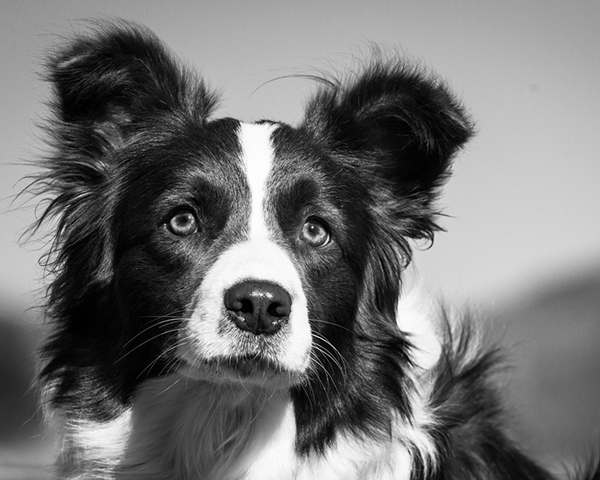Border Collie dog breed information and advice
Learn all about the wonderful Border Collie in this guide, from their energetic and fun-loving nature to their warm and infectious personality.
Discover what keeps this breed’s tail wagging, including their training, grooming and exercise needs. You’ll also find out the Border Collie lifespan, temperament, and their characteristics.
There are many Border Collie colours, the most common being the black and tricolour. The rarest is the blue merle. The colouring of your dog will affect the price you pay for a Border Collie puppy.
The Border Collie was bred for herding, which is why they’re sometimes called sheepdog collies. They’re an obedient and intelligent breed, so are easy to train. They need lots of exercise and are best suited to rural living. Despite being a working dog, they have an affectionate temperament and will be very loyal to you.
Border Collie facts

| Lifespan | 12 - 15 years | |
| How much | £500 - £5,000 for a trained Border Collie | |
| Size | 50 - 56 cm tall | |
| Weight | 25 - 30 kg | |
| Colours | white with any of the following colours: black, white, lilac, brindle, liver, brown, red merle, sable merle, gold, red or tricolour | |
| Grooming | weekly brushing | |
| Temperament | energetic and intelligent | |
| Exercise | two or more hours a day | |
|
Fact references: |
||
Border Collie insurance
Pet insurance may help to cover you for the unexpected, like vet bills, treatment, medication and surgery.
Border Collies can be more prone to developing the following conditions that may need treatment:
• Collie eye anomaly (CEA)
• Hip dysplasia
• Trapped neutrophil syndrome (TNS)
• Neuronal ceroid lipofuscinosis
Sainsbury’s Bank Pet Insurance
Health issues can happen at a young age, so it’s a good idea to take out pet insurance as soon as possible. Sainsbury’s Bank puppy insurance can be taken out as soon as your pet is eight weeks old.
How to care for a Border Collie
Border Collies are one of the most active dog breeds. This means their dietary and exercise needs are much more demanding.
Feeding and nutrition
It’s very important to keep an eye on your Border Collie’s weight as their high energy can mean they burn a lot of calories. Usually, male dogs are bigger and weigh more than females. An adult male should weigh around 30kg on average and will be up to 56cm tall, whereas a female will weigh 25kg and only be up to 50cm tall.
Active dogs need to eat more food, so they don’t become underweight. Food measurement guidelines and nutrient content can be found on the back of the dog food packaging. You can ask your vet if you’re unsure of how much to feed them, and for advice on the best diet for your dog.
Border Collie puppies will need feeding three of four times a day, but when they’re an adult this can be reduced to once or twice daily. Border Collies should be fed at least two hours before exercise. If not, their stomach can swell and twist. This can cause life-threatening blockages and will require surgery.
Grooming
Border Collies can have either a short and sleek coat or a long and coarse coat. Both short and long-haired Border Collies normally need brushing once a week. However, during spring and autumn when they shed a lot, you’ll need to brush them more often. This will collect their falling fur and help keep your home and furniture free from dog hairs.
Exercise
Border Collies are a very active breed and need at least two hours of exercise a day. They should be walked off lead so that they have the chance to run around. They’re obedient so with the right training they should come back when you call.
They love to play fetch and will often bring you something to throw. Playing games is also a great way to add extra exercise to their day and burn off excess energy.
Training
Border Collies are used for sheep herding because they’re obedient and easy to train. They’re great at agility and flyball. Use a ball or treats as rewards during your training sessions.
Working dogs are usually kept in an outside kennel. This means they’re able to go to the toilet when they want. If your dog is living indoors, it is important to start house training your dog from a young age. Luckily, puppy toilet training is easy, and your intelligent Collie will pick it up quickly.
Temperament and behaviour
Border Collies are affectionate, eager to please, gentle and good with children. But despite being good-natured and obedient, Border Collies tend to have predatory instincts that can make them a little more difficult to look after. They need to be kept entertained with plenty of exercise and toys or they can become destructive.
You may find at times their natural instincts will kick in and you’ll find them trying to herd people or other dogs. They can become snappy if other dogs challenge them. Training and exercise can help to stop this.
Common health problems
There are common health issues that can affect your Border Collie. Make sure you are aware of what signs to look for so any health care problems can be treated quickly. Remember, having Border Collie insurance can help reduce the stress of unexpected health bills.
Collie eye anomaly (CEA)
CEA is a hereditary disorder that is present from birth. It causes areas of thinning or holes in the structure of the dog’s eyes. The disorder can lead to blindness in both eyes if it deteriorates, but some dogs will just suffer from some vision loss.
Diagnosis is difficult, and there is no treatment for this disorder. However, dogs with vision loss can still lead happy lives.
Hip dysplasia
This condition affects the ball-and-socket hip joint. It’s a hereditary disease but can also be caused by diet and exercise – overweight dogs are more likely to suffer from the condition.
If your dog has hip dysplasia, it will become lame on the affected leg. Hip replacement surgery may be needed if the condition is severe, which is complex and expensive. If surgery is not required, your vet will give your dog pain relief and anti-inflammatory drugs. These may need to be taken for the rest of your pet’s life. With this medication, your dog could still have a good quality of life.
Hip dysplasia will lead to arthritis in the hip joints in later life. Your dog’s joints will become stiff, and movement will be painful.
Trapped neutrophil syndrome (TNS)
TNS is an inherited condition that stops white blood cells from being released into the bloodstream. This causes a weakened immune system. Most puppies show symptoms within the first few weeks, but some don’t show symptoms for six months.
Dogs with this condition will have delayed development, fever and at least one swollen joint. They’ll also have noticeable facial differences, like an abnormally long head and narrowed ‘ferret-like’ features. Diarrhoea is also common.
Sadly, it’s not curable, and usually fatal. Mild cases can be medicated to increase the Border Collie lifespan. There are some experimental treatments, but these have not been proven .
Reputable breeders will carry out DNA testing for the condition before breeding. Always ask your breeder about this testing before buying your puppy.
Neuronal ceroid lipofuscinosis
Neuronal ceroid lipofuscinosis is an inherited condition that causes early death. It’s a neurodegenerative lysosomal disease that affects a specific enzyme. It damages the dog’s metabolic function and causes nervous system disorders.
Dogs that have the condition usually show signs of neurological disease when they are 15 to 20 months old.
Symptoms include:
• Behaviour changes
• Lack of response to commands
• Loss of interest in playing
• Hallucinations
• Disorientation
• Aggression.
Symptoms get more severe and can progress into:
• Seizures
• Falling
• Lethargy
• Vision loss
Most dogs don’t live longer than 32 months with the disease.
How long do Border Collies live?
On average the Border Collie lifespan is 12 to 15 years. Common health problems linked to Border Collies can reduce life expectancy.
Make sure you feed your dog the correct diet and give them lots of exercise to keep them fit, happy and healthy.
Do Border Collies shed?
Yes, they shed a lot, mostly during spring and autumn. This is the case for both rough and smooth coats. You’ll need to brush your Border Collie regularly (at least once a week) to remove some of the fur. The more that you brush out, the less you’ll find falls out.
How to train a Border Collie
Border Collies are known for being working dogs and were bred for herding sheep. The Border Collie temperament is easy to train as they’re naturally obedient. Use a toy or food treats as a reward during training to make it fun for your dog. Training is also a good way to use up some of their boundless energy and to challenge them mentally.
When do Border Collies calm down?
Border Collies are known for being energetic dogs but will calm down if they’re kept entertained. Give them the chance to run around as often as possible – and when this isn’t possible, give them toys to play with. Interactive toys that reward them with treats work best. Agility and flyball are a great way to exercise your dog, and Border Collies seem to love both. Remember, if their energy isn’t used, Border Collies can become hyperactive and destructive.
So, is a Border Collie right for you?
Full of energy with lots of love to give, the Border Collie is the perfect breed if you live an active lifestyle. They’ll happily join you for a long run and will show you lots of affection. But they can be a demanding dog breed due to their energetic and working instincts. For this reason, a Border Collie probably wouldn’t suit a first-time owner or someone who doesn’t have the time to meet their needs.
Frequently asked questions
Is a Border Collie a good family dog?
Border Collie’s have a lovely temperament and are eager to please, making them good family pets. They’re best suited to an active household as they can be very energetic.
Do Border Collies bark a lot?
Border Collies are visually stimulated and bark at things that move quickly. Their herding instinct also makes them more likely to bark. They have high energy needs and may bark more if bored.
Do Border collies suffer from high anxiety?
Yes, Border Collies are known to be an anxious breed. If they aren’t exercised enough, they can get bored and under stimulated, and this can trigger anxiety. They’re a very social breed, so may suffer from social anxiety if left alone for a long time.

Browse our guides
Choose from our list of helpful guides and information

Explore dog breeds
Find out how to keep your dog healthy and happy

Cat breed guides
How to care for your cat, common health problems and more
References
Content provided from Vetstream’s Vetlexicon 
Vetstream ltd (online) Border Collie. In: Vetlexicon Canis. Vetstream Ltd, UK. Website: https://vetstream.com/treat/canis/breeds-pages/border-collie 
Harari J & Langley-Hobbs S (online) Periodontal disease. In: Vetlexicon Canis. Vetstream Ltd, UK. Website: https://vetstream.com/treat/canis/diseases/hip-dysplasia 
Vetstream Ltd (online) Hip dysplasia Owner Factsheet. In: Vetlexicon Canis. Vetstream Ltd, UK. Website: https://vetstream.com/clinical-reference/canis/owner-factsheets/hip-dysplasia 
Brooks D E & Oliver J (online) Collie eye anomaly. In: Vetlexicon Canis. Vetstream Ltd, UK. Website: https://vetstream.com/treat/canis/diseases/collie-eye-anomaly 
Batchelor D & Tappin S (online) Collie eye anomaly. In: Vetlexicon Canis. Vetstream Ltd, UK. Website: https://vetstream.com/treat/canis/diseases/trapped-neutrophil-syndrome 
Terms and conditions
Important information
Sainsbury's Bank plc, Registered Office, 33 Charterhouse Street, London, EC1M 6HA (registered in England and Wales, no 3279730) is authorised by the Prudential Regulation Authority and regulated by the Financial Conduct Authority and the Prudential Regulation Authority (register no. 184514).
Sainsbury's Supermarkets Ltd is an appointed representative of Sainsbury's Bank plc. Sainsbury's Bank plc acts as an introducer to Pinnacle Insurance Ltd who is authorised by the Prudential Regulation Authority and regulated by the Financial Conduct Authority and the Prudential Regulation Authority (register number 110866). Registered office: 4th Floor, Limelight, Elstree Way, Borehamwood, Hertfordshire, WD6 1JH. Sainsbury’s Bank Pet Insurance is arranged, administered and underwritten by Pinnacle Insurance Ltd. Sainsbury's Bank plc and Pinnacle Insurance Ltd are not part of the same corporate group.
We do not provide personal recommendations to customers.
